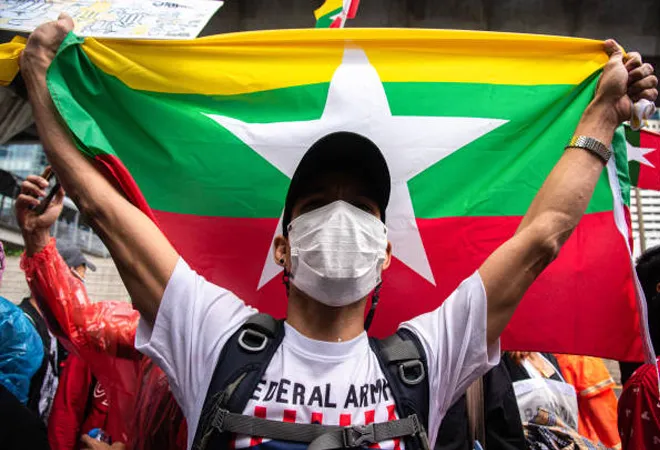
As we celebrate International Democracy Day across the globe, it’s time we analyse Myanmar’s struggle toward establishing democracy. After five years of sluggish democratic transition, Myanmar has slipped back to authoritarian rule, yet again. Popularly known as a fledgling democracy, it fell prey to a coup in February 2021 as the Tatmadaw (Myanmar military) refused to concur to the 2020 elections that witnessed the landslide victory of the National League for Democracy (NLD) for a second term. While the Tatmadaw has stated that fresh multiparty elections will take place in 2023, the process is designed to achieve a ‘disciplined’ democratic government that will be structured and controlled by the military regime which will continue to remain in power irrespective of who is the ruling party.
Myanmar has been ruled by the military regime for over five decades before the democratic government came to power in 2016. Scholars studying regime transitions often state that democracy does not only entail electing a new government through holding seamless, fair, and regular elections but it should be equally inclusive. In particular, new political leaders must enjoy sufficient effective power to govern.
Scholars studying regime transitions often state that democracy does not only entail electing a new government through holding seamless, fair, and regular elections but it should be equally inclusive.
If we observe the NLD government’s trajectory; the civilian government, while in power, bore a desire towards maintaining
an agreeable relationship with the Junta to slowly bring about the desired changes within the system. The party did not respond much to the military’s actions in the matter of the ethnic conflicts within the country. The Rohingya issue was a major instance in this regard where the NLD government remained silent and declared the issue an internal matter of the nation claiming that no ethnic cleansing or genocide had taken place, while more than a million crossed the borders. While the international spectators have been severely critical of Aung San Suu Kyi who was considered to be the peace laureate and a beacon for human rights, she had little power to manoeuvre the situation though, she could have handled it better.
Impediments to democratic rule
Much of the lack of power of the civilian government is a precondition set by
the 2008 Constitution. When the military government decided to hold multiparty elections in 2003 and bring about ‘disciplined democracy’, it first tried to create a Constitution that helps tilt the balance of power in its favour. The existing Constitution allocates 25 percent representation of unelected military officers in Myanmar’s Parliament. The Constitution also grants sovereign powers to the Commander-in-Chief of the armed forces in emergencies, including the right to exercise control over the branches of the executive, legislature, and judiciary. Amending the Constitution is tricky as per a few sections of Article 436 where more than 75 percent of members need to vote in favour of approved amendments. Thus, no major changes to the Constitution, whether to decrease military control or power have been achieved to date by the NLD party.
While the alteration of authoritarian civil-military relations remains significant to ensure the proper functioning of democratic government, the fundamentals of this conversion are established by the military leaders from a position of power and authority. Thus, they can regulate the course and consequences of the transition.
The Constitution also grants sovereign powers to the Commander-in-Chief of the armed forces in emergencies, including the right to exercise control over the branches of the executive, legislature, and judiciary.
The challenge for a democratic government during transition is to establish functional institutions of civilian control over the military. These challenges are especially acute and arduous in countries with a strong legacy of militarism and where the military can secure political and institutional leverage for itself during the transition to democracy. Thus, the failure of NLD to amend the Constitution or to successfully reform the General Administration Department (GAD) was evident. In addition, the weakness of democratic leadership and its centralised character further stunted the progress towards a stable democracy. Thus, the concept of democracy in Myanmar, free from military gaze, remains a pipedream.
Post-coup rule
After the coup in 2021, the Junta tactics have become more coercive and violent. While the caretaker government is claiming to hold democratic multiparty elections next year, its actions have been resonant with the repressive authoritarian rule. The Junta is controlling the nation on two levels. On one, it is controlling the masses by brutally suppressing the pro-democracy and ethnic movements arising on the ground demanding the return of democratic rule by abducting, detaining, or killing protesters.
On the next level, it is monitoring the prominent democratic leaders and parties by arresting activists and disbanding parties they consider a threat. The slapping of various counts of charges on Aung San Suu Kyi and other prominent leaders has ensured that they do not come out of prison in this lifetime. Executing the pro-democracy activists to instil fear in the public and the opposition is another tactic. In addition, not agreeing to enter into any form of dialogue or negotiation with the majority opposition party and declaring it as a terrorist organisation is refusing to follow the 5-point consensus as forwarded by ASEAN.
The Union Election Commission is currently worried that the basic voter demographic activities will not be completed on time due to ongoing clashes between the military forces and different ethnic parties.
Now, Junta is further planning to amend the
Political Parties Registration Law to ensure that future election results do not favour any one specific party and landslide victories are unachievable. The amendment will surely affect the pro-democracy parties’ involvement and participation and thus the balance of power will continue to favour the military regime. The Union Election Commission is currently worried that the basic voter demographic activities will not be completed on time due to ongoing clashes between the
military forces and different ethnic parties. Thus, holding a free, fair, and timely election seems improbable.
As per the 2008 Constitution, the emergency rule can be enforced for one year and can be extended twice for six months each after which elections shall be held. The emergency rule was recently extended for the second time and will come to an end in February 2023, and the election must be ideally held within six months from then. Ironically, the military general is citing political instability as the main reason for delaying elections.
While democracy seems to be the need of the hour, according to several scholars studying regime change, transformation only sets in when the military regime itself initiates the shift towards the democratic process. While the National Unity Government (NUG), is functioning as a proper government with its
own cabinet, and ministries, where they design policies, funding, etc, without recognition from the outside community, much of its power play dwindle into irrelevance.
As can be observed, the current political ill will towards liberal democratic government might set in motion the rule of a disciplined democracy where the conditions of power continue to be slanted towards military power.
The views expressed above belong to the author(s). ORF research and analyses now available on Telegram! Click here to access our curated content — blogs, longforms and interviews.



 As we celebrate International Democracy Day across the globe, it’s time we analyse Myanmar’s struggle toward establishing democracy. After five years of sluggish democratic transition, Myanmar has slipped back to authoritarian rule, yet again. Popularly known as a fledgling democracy, it fell prey to a coup in February 2021 as the Tatmadaw (Myanmar military) refused to concur to the 2020 elections that witnessed the landslide victory of the National League for Democracy (NLD) for a second term. While the Tatmadaw has stated that fresh multiparty elections will take place in 2023, the process is designed to achieve a ‘disciplined’ democratic government that will be structured and controlled by the military regime which will continue to remain in power irrespective of who is the ruling party.
Myanmar has been ruled by the military regime for over five decades before the democratic government came to power in 2016. Scholars studying regime transitions often state that democracy does not only entail electing a new government through holding seamless, fair, and regular elections but it should be equally inclusive. In particular, new political leaders must enjoy sufficient effective power to govern.
As we celebrate International Democracy Day across the globe, it’s time we analyse Myanmar’s struggle toward establishing democracy. After five years of sluggish democratic transition, Myanmar has slipped back to authoritarian rule, yet again. Popularly known as a fledgling democracy, it fell prey to a coup in February 2021 as the Tatmadaw (Myanmar military) refused to concur to the 2020 elections that witnessed the landslide victory of the National League for Democracy (NLD) for a second term. While the Tatmadaw has stated that fresh multiparty elections will take place in 2023, the process is designed to achieve a ‘disciplined’ democratic government that will be structured and controlled by the military regime which will continue to remain in power irrespective of who is the ruling party.
Myanmar has been ruled by the military regime for over five decades before the democratic government came to power in 2016. Scholars studying regime transitions often state that democracy does not only entail electing a new government through holding seamless, fair, and regular elections but it should be equally inclusive. In particular, new political leaders must enjoy sufficient effective power to govern.
 PREV
PREV


